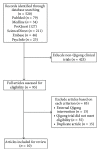Effects of qigong on depression: a systemic review
- PMID: 23533461
- PMCID: PMC3603628
- DOI: 10.1155/2013/134737
Effects of qigong on depression: a systemic review
Abstract
Physical exercises and relaxation have been found to be beneficial for depression. However, there is little evidence on the use of Qigong, a mind-body practice integrating gentle exercise and relaxation, in the management of depression. The aim of this paper is to evaluate the effects of Qigong on depression. The paper examined clinical trials measuring the effect of Qigong on depression within six large-scale medical research databases (PubMed, Medline, ProQuest, Science Direct, EMBASE, and PsycInfo) till October 2011. Key words "Qigong," "depression," and "mood" were used. Ten studies were identified as original randomized controlled trial (RCT) studies investigating the effect of Qigong on depression as primary (n = 2) or secondary outcome (n = 8). Four studies reported positive results of the Qigong treatment on depression; two reported that Qigong effect on depression was as effective as physical exercise. One study reported that Qigong was comparable to a conventional rehabilitation program, but the remaining three studies found no benefits of Qigong on depression. While the evidence suggests the potential effects of Qigong in the treatment of depression, the review of the literature shows inconclusive results. Further research using rigorous study designs is necessary to investigate the effectiveness of Qigong in depression.
Similar articles
-
The effect of tai chi and Qigong exercise on depression and anxiety of individuals with substance use disorders: a systematic review and meta-analysis.BMC Complement Med Ther. 2020 May 29;20(1):161. doi: 10.1186/s12906-020-02967-8. BMC Complement Med Ther. 2020. PMID: 32471415 Free PMC article.
-
Translating "mind-in-body": two models of patient experience underlying a randomized controlled trial of qigong.Cult Med Psychiatry. 2002 Dec;26(4):419-47. doi: 10.1023/a:1021772324119. Cult Med Psychiatry. 2002. PMID: 12572768
-
The efficacy of Guolin-Qigong on the body-mind health of Chinese women with breast cancer: a randomized controlled trial.Qual Life Res. 2017 Sep;26(9):2321-2331. doi: 10.1007/s11136-017-1576-7. Epub 2017 Apr 18. Qual Life Res. 2017. Retraction in: Qual Life Res. 2021 Mar;30(3):955. doi: 10.1007/s11136-020-02672-6. PMID: 28421384 Retracted. Clinical Trial.
-
Mind-Body Health Benefits of Traditional Chinese Qigong on Women: A Systematic Review of Randomized Controlled Trials.Evid Based Complement Alternat Med. 2021 Sep 14;2021:7443498. doi: 10.1155/2021/7443498. eCollection 2021. Evid Based Complement Alternat Med. 2021. PMID: 34567220 Free PMC article. Review.
-
Qigong Mind-Body Exercise as a Biopsychosocial Therapy for Persistent Post-Surgical Pain in Breast Cancer: A Pilot Study.Integr Cancer Ther. 2020 Jan-Dec;19:1534735419893766. doi: 10.1177/1534735419893766. Integr Cancer Ther. 2020. PMID: 32009481 Free PMC article.
Cited by
-
The effect of Imaginary Working Qigong on the psychological well-being of college students: Study protocol for a randomized controlled trial.Medicine (Baltimore). 2018 Nov;97(44):e13043. doi: 10.1097/MD.0000000000013043. Medicine (Baltimore). 2018. PMID: 30383672 Free PMC article. Clinical Trial.
-
Qigong for hypertension: a systematic review.Medicine (Baltimore). 2015 Jan;94(1):e352. doi: 10.1097/MD.0000000000000352. Medicine (Baltimore). 2015. PMID: 25569652 Free PMC article.
-
Meditative movement for depression and anxiety.Front Psychiatry. 2013 Jul 24;4:71. doi: 10.3389/fpsyt.2013.00071. eCollection 2013. Front Psychiatry. 2013. PMID: 23898306 Free PMC article.
-
Effects of a mutual recovery intervention on mental health in depressed elderly community-dwelling adults: a pilot study.BMC Public Health. 2017 Jan 3;17(1):4. doi: 10.1186/s12889-016-3930-z. BMC Public Health. 2017. PMID: 28049503 Free PMC article.
-
Yijinjing Qigong intervention shows strong evidence on clinical effectiveness and electroencephalography signal features for early poststroke depression: A randomized, controlled trial.Front Aging Neurosci. 2022 Aug 10;14:956316. doi: 10.3389/fnagi.2022.956316. eCollection 2022. Front Aging Neurosci. 2022. PMID: 36034130 Free PMC article.
References
-
- Pincus HA, Pettit AR. The societal costs of chronic major depression. Journal of Clinical Psychiatry. 2001;62(supplement 6):5–9. - PubMed
-
- Kessler RC, Berglund P, Demler O, et al. The epidemiology of major depressive disorder: results from the National Comorbidity Survey Replication (NCS-R) Journal of the American Medical Association. 2003;289(23):3095–3105. - PubMed
-
- DeVol R, Bedroussian A. An Unhealthy America: The Economic Burden of Chronic Disease Charting a New Course to Save Lives and Increase Productivity and Economic Growth. Santa Monica, Calif, USA: Milken Institute; 2007.
LinkOut - more resources
Full Text Sources
Other Literature Sources
Medical


